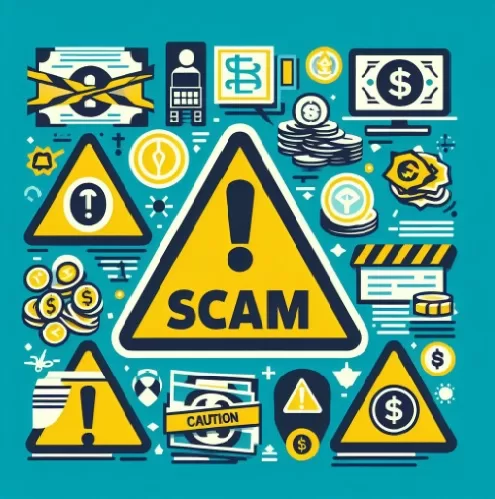Introduction
In today’s digital world, Foreign Money Exchange plays a vital role in cross-border transactions. So do you know how? Well, it is because it significantly impacts economies and individual finances.
However, as people get into the dynamic world of currency exchange, a pertinent question arises: Does this constant flux provide an opportunity for scammers? Particularly, yes!
Promises of high returns, deceptive platforms, and phishing scams lure unsuspecting individuals into financial traps. Moreover, as this situation comes, the question arises: Is there an inside scoop that scammers exploit within the world of foreign money exchange scams?
Do you want to know about this? Let’s find it in this post! But before everything it is important to understand how foreign money exchange brings up the opportunity for scammers. Ultimately, we will first understand the Foreign Money Exchange scams.
What is Foreign Money Exchange?
Foreign money exchange, also known as forex (foreign exchange) or currency exchange, refers to the global marketplace where currencies are bought and sold. This market is crucial for international trade and investment, allowing individuals, businesses, and governments to convert one currency into another. Exchange rates fluctuate based on various factors such as economic indicators, geopolitical events, and market sentiment.
Individuals may engage in foreign money exchange for various reasons, including travel, international trade, investment, or speculation on currency value changes. Financial institutions, currency exchange offices, and online platforms facilitate these transactions.
Scammers often exploit individuals in the world of foreign currency investment scams through various deceptive schemes.
Here are some common foreign money exchange scams:
-
- Sweepstakes and foreign money offer scams: Scammers ask victims to wire them money for taxes, customs, bonding, processing, and legal fees, or to have money in a foreign country transferred to their bank account for safekeeping. They often claim to be in another country and make it seem too difficult and complicated to send the money directly.
-
- Lottery scams: Scammers take US customers into buying tickets for high-stakes international lotteries by phone and direct mail. They often claim that the consumer will receive a large sum of money if they win.
-
- Forex trading scams: Scammers use sophisticated-sounding offers placed in newspaper advertisements, radio promotions, or on the internet to attract customers. They promise high returns coupled with low risks from investments in foreign currency (forex) contracts.
-
- Unlicensed forex traders: Scammers may pose as forex traders and ask for personal information such as names, phone numbers, and email addresses. They may also promise that with forex, there is no “down-turning market”.
-
- Compromised password and account takeover: Scammers may use compromised passwords to take over a victim’s Forex account and steal their money.
The Common Strategies Used In Foreign Money Exchange Scams
So, how do hackers perpetrate foreign currency exchange scams and acquire the necessary bank logins for sale? Their skill and unwavering desire to navigate the complex labyrinth of online security hold the key to the solution. Hackers frequently employ phishing, keyloggers, phoney applications, mobile banking Trojans, and other malicious strategies to get the necessary data.
Here are some of the strategies used in foreign currency investment scams:
- Fake Currency Exchange Websites
Scammers create fraudulent websites that mimic legitimate currency exchange platforms. These fake sites may appear convincing, with professional designs and seemingly competitive exchange rates. However, once users deposit their funds, the scammers disappear, leaving victims with significant financial losses.
- Phishing Emails and Messages
Scammers may send phishing emails or messages posing as reputable currency exchange services. These messages often contain links to fake websites where users are prompted to enter personal information or login credentials. Once obtained, this information can be used to access the victim’s legitimate accounts or steal funds.
- Advance Fee Fraud
In this scheme, scammers promise attractive exchange rates or investment opportunities but require victims to pay upfront fees before the transaction can take place. Once the fee is paid, the scammer disappears, and the promised exchange or investment never occurs.
- Overseas Job Scams
Some scammers pose as employers offering overseas jobs that involve currency exchange services. Victims may be asked to pay fees for training, equipment, or other expenses. These scammers vanish after receiving the payments, and the promised job never materializes.
- Impersonation of Reputable Companies
Scammers who may impersonate well-known and reputable currency exchange companies by using similar names, logos, or branding. Victims who believe they are dealing with a trusted entity may fall prey to these scams and end up losing money.
- Ponzi Schemes
These schemes create the appearance of profitability by using the funds of new investors to pay returns to previous investors. Scammers may pose as currency traders, promising high returns on investments. The plan eventually falls apart, causing a large number of investors to lose money.
- Social Engineering and Manipulation
Scammers may employ social engineering tactics to manipulate individuals into making currency exchanges. This could involve building a fake relationship, creating a sense of urgency, or exploiting emotional vulnerabilities to convince victims to send money for non-existent investment opportunities or emergencies.
Even though the world of Foreign Money Exchange might appear fascinating, only a skilled hacker can get through it. In fact, being a hacker one can seamlessly have the VIP transfer service. However, scammers may also use terms like “VIP transfer service” to lure unsuspecting individuals into fraudulent schemes.
Although bank logins for sale are available with Western Union Hack to leverage extensive knowledge and resources, maintain a huge database of Credit card dumps with PIN. This collection is accessible to clients interested in buying bank logins.
Conclusion
Overall, the world of Foreign Money Exchange Scams seems huge as well as difficult overall, but it has some inside scoops. Without the proper knowledge, entering the hacking world as a beginner can be a little challenging. Nevertheless, several purportedly skilled hackers make the claim that they can assist you while really only looking to take your money!
Still, not every one of them is a scammer. There are genuine hackers, just as there are bank transfer hackers! They have a strong track record and have perfected the art of bank login hacking. They are dependable and trustworthy, and they put your safety first.
Bank Transfer Hackers is the best option if you’re looking for a way to make quick money with no risk. Their expertise and dedication to your safety set them apart! Make contact with us right now to confidently enter the alluring world of foreign currency exchange scams.


